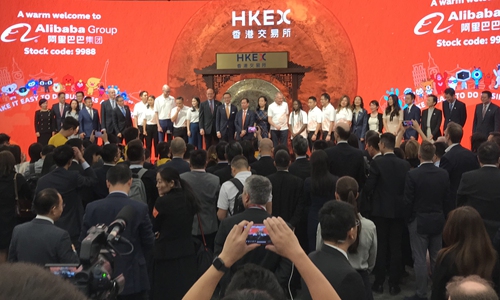HOME >> BUSINESS
Chinese technology firms shift listings away from US
By Chen Qingqing in Hong Kong and Li Xuanmin in Beijing Source:Global Times Published: 2019/11/26 20:33:41
More may follow Alibaba with Hong Kong IPO

The listing ceremony of Alibaba's Hong Kong debut. /CGTN Photo
Chinese technology behemoth Alibaba made headlines on Tuesday by going "back home" with the world's largest IPO so far in Hong Kong, in addition to its US listing.
Observers saw Alibaba's move as a trend, under which more Chinese companies will list either in Hong Kong or in the A-share market, so as to insulate themselves from being targeted by the US government amid a boiling trade war.
"We're coming back home," read the latest post by Alibaba on Weibo on Tuesday, shortly after the company ring the bell to debut on the Hong Kong stock exchange. The company issued 500 million new ordinary shares at an offer price of HK$176 ($22.49) plus 75 million "greenshoe" options, aiming to raise HK$88 billion in gross proceeds.
The comments left under the post are overwhelmed by joy and happiness. "It's good to have you back… and you are not afraid of anything when you're at home," said one netizen named Shitoudunai.
Against the backdrop of the escalating trade war, it is natural for Chinese companies to guard against higher political risks incurred by listing in the US and go back to their home market, industry observers said.
"The US government has adopted a hostile approach on Chinese technology companies. So their listings will be affected if US further badmouths China and blockades those companies,"Liao Qun, chief economist at China CITIC Bank in Hong Kong, told the Global Times on Tuesday.
Analysts predicted that Alibaba's home-coming will drive more Chinese technology companies to dual list in both China and the US, a flexible way that enables Chinese enterprises to quit the US market if necessary.
Washington has been waging an all-round trade war against China, under which a number of Chinese high-technology companies are being targeted. US President Donald Trump was also reportedly considering delisting Chinese companies from US stock exchanges, Reuters reported in September.
"Chinese companies will be treated more fairly in their home market, while in the US they will be subject to a jaundiced view, because of their national origin," Cong Yi, a professor at the Tianjin University of Finance and Economics, told the Global Times on Tuesday.
Liao added that US investors do not have a deep understanding of China, including the potential of its technology companies, which means that their market value could be underestimated. "China's capital market is opening up. It is a good option to list in China where investors know your products and technology better," Cong said.
As of February 25, 2019, there were 156 Chinese companies listed on US exchanges with a total market capitalization of $1.2 trillion, according to a statement on the website of the US-China Economic and Security Review Commission. In addition to Alibaba, other technology giants listed in the US include Baidu and jd.com.
Robert H McCooey, a senior vice president of Nasdaq's listing services unit, said at an event in Beijing on Tuesday that the US welcomes Chinese companies to get listed and Nasdaq also welcomes Chinese companies. As there are some rumors in the market, McCooey said he hoped his comment could deliver the right voice.
The timing of his words, coming coincidently with Alibaba's mega listing in Hong Kong, shows panic among US business elites and their desire to maintain connections to Chinese companies and the vibrant and innovative Chinese markets, industry observers said. Nasdaq is designed for the listing of technology start-ups and unicorns, while China is an important market to apply innovative technology.
"US capital markets don't want to miss the investment opportunities powered by China's rapid technology rise. But if the trade war sees no sign of reaching a truce, the back-flow will happen on a large scale," Cong said.
Newspaper headline: Technology firms shift listings away from US
Posted in: INDUSTRIES,ECONOMY,CHINA-US FOCUS